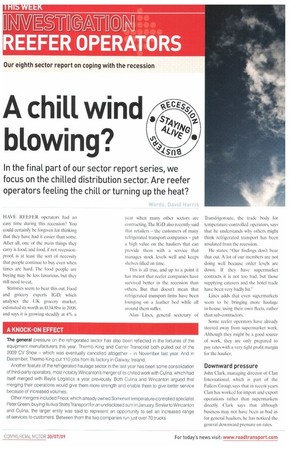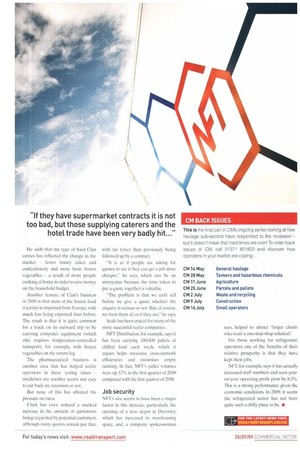blowing?
Page 20

Page 21

If you've noticed an error in this article please click here to report it so we can fix it.
In the final part of our sector report series, we focus on the chilled distribution sector. Are reefer operators feeling the chill or turning up the heat?
HAVE REEFER operators had an easy time during this recession? You could certainly be forgiven for thinking that they have had it easier than some. After all, one of the main things they carry is food, and food, if not recessionproof, is at least the sort of necessity that people continue to buy even when times arc hard. The food people are buying may be less luxurious, but they still need to eat.
Statistics seem to bear this out. Food and grocery experts IGD, which analyses the UK grocery market. estimated its worth as £134.8bn in 2008. and says it is growing steadily at 4% a year when many other sectors are contracting. The I G D also recently said that retailers — the customers of many refrigerated transport companies — put a high value on the hauliers that can provide them with a service that manages stock levels well and keeps shelves filled on time.
This is all true, and up to a point it has meant that reefer companies have survived better in the recession than others. But that doesn't mean that refrigerated transport firms have been lounging on a feather bed while all around them suffer.
Alan Lines, general secretary of Transfrigoroute. the trade body for temperature-controlled operators, says that he understands why others might think refrigerated transport has been insulated from the recession.
He states: -Our findings don't bear that out. A lot of our members are not doing well because order levels are down. If they have supermarket contracts it is not too bad, but those supplying caterers and the hotel trade have been very badly hit.''
Lines adds that even supermarkets seem to be bringing more haulage in-house, using their own fleets, rather than sub-contractors.
Some reefer operators have already steered away from supermarket work. Although they might be a good source of work, they are only prepared to pay rates with a very tight profit margin for the haulier.
Downward pressure
John Clark, managing director of Clan International, which is part of the Fullers Group, says that in recent years Clan has worked for import and export operations rather than supermarkets directly. Clark says that although business may not have been as bad as for general hauliers, he has noticed the general downward pressure on rates.
He adds that the type of food Clan carries has reflected the change in the market fewer luxury cakes and confectionery and more basic frozen vegetables — a result of more people cooking at home in order to save money on the household budget.
Another feature of Clan's business in 2009 is that most of the frozen food it carries is imported from Europe. with much less being exported than before. The result is that it is quite common for a truck on its outward trip to be carrying computer equipment (which also requires temperature-controlled transport), for example, with frozen vegetables on the return leg.
The pharmaceutical business is another area that has helped reefer operators in these testing times — medicines are another sector not easy to cut hack on, recession or not.
But none of this has affected the pressure on rates.
Clark has even noticed a marked increase in the amount of quotations being requested by potential customers. although many quotes remain just that. with far fewer than previously being followed up by a contract.
"It is as if people are asking for quotes to see if they can get a job done cheaper,he says, which can be an annoyance because the time taken to put a quote together is valuable.
"The problem is that we can't tell before we give a quote whether the enquiry is serious or not. But, of course, we treat them all as if they are," he says.
Scale has been crucial for many of the more successful reefer companies.
NET Distribution, for example, says it has been carrying 100,000 pallets of chilled food each week, which it argues helps maximise cross-network efficiencies and minimises empty running. In fact, NET's pallet volumes were up 13% in the first quarter of 2009 compared with the first quarter of 2008.
Job security
NFT's size seems to have been a major factor in this increase, particularly the opening of a new depot at Daventry, which has increased its warehousing space, and, a company spokeswoman says, helped to attract "larger client who want a one-stop-shop solution': For those working for refrigerated operators, one of the benefits of then relative prosperity is that they have kept their jobs.
NFI', for example, says it has actual]) increased staff numbers and seen year on-year operating profit grow by 8.3% This is a strong performance given tht, economic conditions. In 2009, it seem. the refrigerated sector has not beer quite such a chilly place to be. •












































































































































